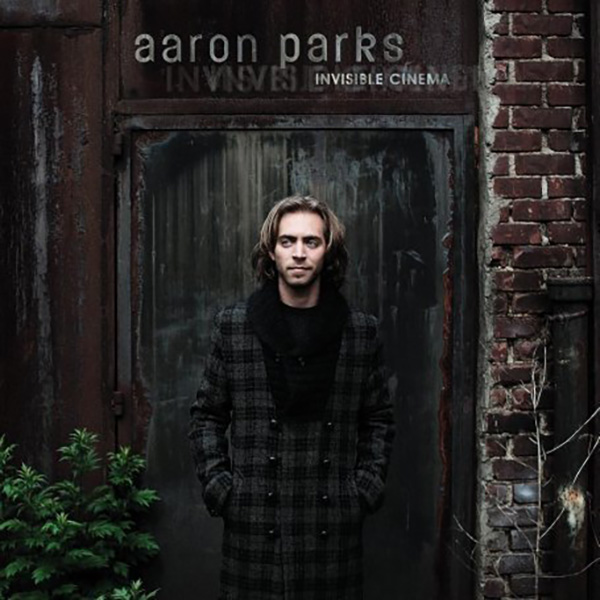
by Ian Mann
January 07, 2009
/ ALBUM
A remarkably mature début. Parks is clearly a major new figure on the scene.
The young pianist and keyboard player Aaron Parks is one of the rising stars of the jazz firmament. At just twenty four years of age he has secured a prestigious solo recording contracting with the famous Blue Note label, now a subsidiary of the EMI group.
Parks has made his name through his work as a sideman with Terence Blanchard, Kurt Rosenwinkel, Eric Harland and others. His stint with Blanchard probably gained him the most attention and Parks appeared on three of the trumpeter’s Blue Note releases “Bounce”, “Flow” and “A Tale Of God’s Will”.
For “Invisible Cinema” Parks has recruited drummer Harland and bassist Matt Penman. These three worked together on Penman’s own “Catch Of The Day” in 2007. The line up is completed by guitarist Mike Moreno, a choice perhaps influenced by Parks’ work with Kurt Rosenwinkel. Parks appeared on Moreno’s solo début “Between The Lines” so it can be seen that there is a strong connection between the leader and his chosen players.
Moreno and Parks complement each other well on the pianist’s expansive, highly individual compositions. As befits a native of Seattle there are rock elements in Parks’ work but these are tastefully deployed and “Invisible Cinema” remains above all a jazz record.
Parks has described the album as “the soundtrack to a movie that doesn’t exist” and the music certainly exhibits the cinematic and pictorial qualities implied by the title. Stylistically the record inhabits a broad canvas that ranges from the delicate solo piano of “Into The Labyrinth” and “Afterglow” to the rock influenced “Nemesis” and “Harvesting Dance”. There are hints at the compositional styles of Keith Jarrett, Pat Metheny and electric era Chick Corea with Parks also citing Wayne Shorter as a key influence.
“Travelers” begins the album in trio mode with Parks’ piano supported by Harland’s skittering snare drum groove as Penman plays the anchor role. Parks’ playing is reminiscent of both Jarrett and Brad Mehldau but Harland’s distinctive contribution owes more to the worlds of hip hop or drum ‘n’ bass. An interesting start to say the least.
The lengthy “Peaceful Warrior” introduces Moreno to the fold and reveals a more orchestral style of writing redolent of Metheny or Corea. There is perhaps a nod to the latter in the tune’s title. This shifting magnum opus includes excellent solos from both Parks and Moreno. Despite the tonal similarities of their instruments they rarely get in each other’s way and combine well together. In many ways this pairing is more successful than the high profile Metheny/Mehldau combination which never quite seemed to work as well as it might have.
The insistent"Nemesis” combines the groove based approach of the opener with a strong melody and rock dynamics. Parks’ own playing slips assuredly between rhythmic and solo functions and Moreno makes a strong rock influenced contribution. Parks even throws a little mellotron and glockenspiel into the mix to broaden the palette.
The brief “Riddle Me This” is based around Penman’s opening bass riff combined with Harland’s drum groove. Parks dances attractively around the rhythms and although this is the slightest item thus far it’s still highly enjoyable.
“Into The Labyrinth” is essentially Parks solo, with judicious electric keyboard layerings added to his ruminative acoustic piano. The piece acts as a gentle interlude before the band return for three more rock influenced pieces.
“Karma” combines Metheny style lyricism with the propulsive grooves of Harland and Penman. There is an agile solo from the bass man and a sparkling contribution from Parks himself.
“Roadside Distraction” is a brief and enjoyable Jarrett style vamp that recalls Jarrett’s late 60’s/early 70’s work with long deceased guitarist Sam Browne.
“Harvesting Dance” is arguably the album’s centre piece with a running time of some nine and a half minutes. The way Parks subtly builds the piece again hints at Metheny’s influence but the melody draws from Bulgarian folk music and Parks also cites John Zorn as an influence. Moreno’s full on solo lifts the piece into the stratosphere and there is a dazzling feature for the excellent Harland. Parks is clearly very proud of this composition (which initially appeared on Blanchards’s “Flow”) and rightly so. Impressive stuff.
“Praise” borrows a title from Metheny and is an attractive, vaguely hymnal ballad in 5/4 that provides a welcome contrast to “Harvesting Dance”‘s pyrotechnics.
The stately solo piano of “Afterglow” closes the album on a suitably elegiac note.
Parks is clearly a major new figure on the scene. Not only is he a talented instrumentalist but he exhibits a remarkable maturity as a composer, blending traditional and contemporary influences with a master’s touch. He receives excellent support from his three colleagues who all make superb contributions.
“Invisible Cinema” beats with a jazz heart and is a remarkably mature solo début. We will doubtless be hearing a lot more from this singularly talented young man.
blog comments powered by Disqus